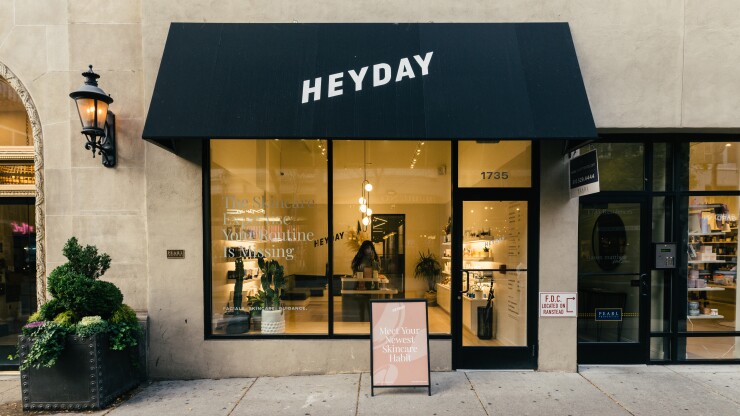Hollywood's Hairroin Salon has almost as many ways to pay — and people who need to be paid — as actual hair styles on offer. And that doesn't fully consider the wave of independent contractors the salon started using over the past year.
"We have a tattoo artist, who is a rental, who wants to use our main payment system," said Janine Jarman, who has operated the salon in Hollywood for the past 16 years. "There aren't a lot of easy ways to do that."
Like a lot of salons, Hairroin has complex staffing and workflow requirements, creating challenges in processing consumer transactions and payroll. As a result, it's using a payment system that's specifically designed for the salon industry.
The technology provider, Los Angeles-based Boulevard, sells integrated software for booking, point of sale software, scheduling, business management and incentive marketing for clients and staff and recently launched Boulevard Payments. It's like a stylists' equivalent of Stripe or Square, with programs that accommodate the distinct processes for beauty salons, barbershops or related businesses — such as combining gig worker and full-time staff payments or melding booking schedules for stylists with different areas of expertise.
"Historically, the salon space has been dominated by cash-handling businesses," said Matt Danna, co-founder and CEO of Boulevard, adding that's led to disconnected programs for merchant processing and a fragmented workflow.
Boulevard just launched a software-as-a-service integration of several of its features, acting as a payment facilitator specializing in salons, barbershops and related businesses.
Boulevard's payment facilitator platform charges different monthly fees based on the range of services it provides.

"It's always been awkward in salons or spas, where there's an ATM in the back or if the customer puts cash in an envelope and leaves it on the front desk," Danna said. "What we're looking to do is to make all of that digital, along with the booking and management, in one experience."
There are about 900,000 salons and more than 135,000 barbershops in the U.S., according to
Boulevard is trying to thread a needle between software platforms that serve the salon industry and payment companies that offer booking apps for salons. Stripe, for example, has a
Within the beauty industry, there are a handful of business management software companies that
As merchant models become more complex due to the stress of serving consumers in multiple channels while providing customized experiences, there will be more opportunities for payment facilitators that cater to specific services.
"There are a variety of industry-specific payment technologies that service unique needs of the individual industries," said Rick Oglesby, president of AZ Payments Group, adding lawyers, for example, do a lot of work on retainer, so they pre-bill retainer amounts and those amounts need to be held in separate escrow accounts.
"Many of these solutions are too niche-oriented, the opportunities too small, for the major processors to pursue directly, so there's an ecosystem of industry specialists that create the value-added solutions to fit the needs of the niches," Oglesby said.
Hairroin, for example, has to book appointments for stylists, hair colorists, nail technicians and the tattoo artist. Some of the professionals work on commission, some on contract and some on salary. All of these services are booked and billed differently, with different costs or rates. But there's also a need to avoid treating each person at the salon as a different business.
"We started with an actual paper desktop calendar to book appointments, and we moved into computers that stylists could use to edit their days and their schedules," Jarman said. "But that got difficult because of the different services that we have and how they overlap."
By connecting to the Boulevard's program, Jarman hopes to connect the salon's staff and consumers to the same management system and user interface, centralizing payroll and transaction processing. There are also specific problems she hopes to avoid, such as clients bailing on appointments at the last minute, leaving time slots open and unfillable.
"The digital system allows the payment to be collected upfront, so the time is paid for if the client doesn't show up," Jarman said. "It's not always possible to fill an open slot that quickly, so the stylist can't get paid."
Even within a single niche like hair salons, there are different models that the payment facilitator model can accommodate, said Michael Pollak, CEO of Heyday Skincare, which has 10 locations in New York, Philadelphia and Los Angeles.
Heyday has spa services and in-store and online sales for a line of skin care products. It uses the Boulevard system to track booking history, product sales and payment processing.
Heyday is additionally planning to franchise its business to expand geographically.
"Different payment types have different taxes," Pollack said. "A facial is a service, which gets one type of tax. And purchasing a skin care product in the store or online has a sales tax. That has to be managed."
And clients also pay differently, with some using vouchers, some paying on a subscription and some upon the time of service. "There's gratuities and commissions for staff, and that has to be done smoothly at the point of sale in a service-oriented environment, whether it's a mom-and-pop location or a multi-location footprint," Pollack said.





